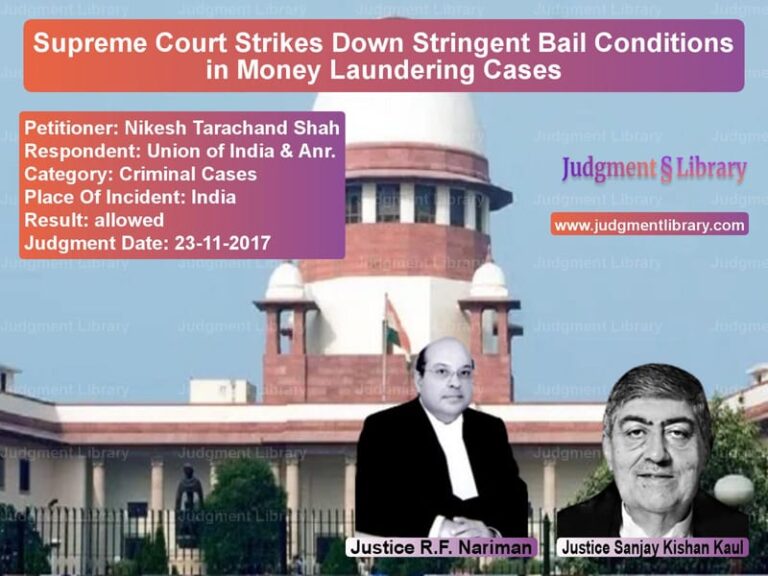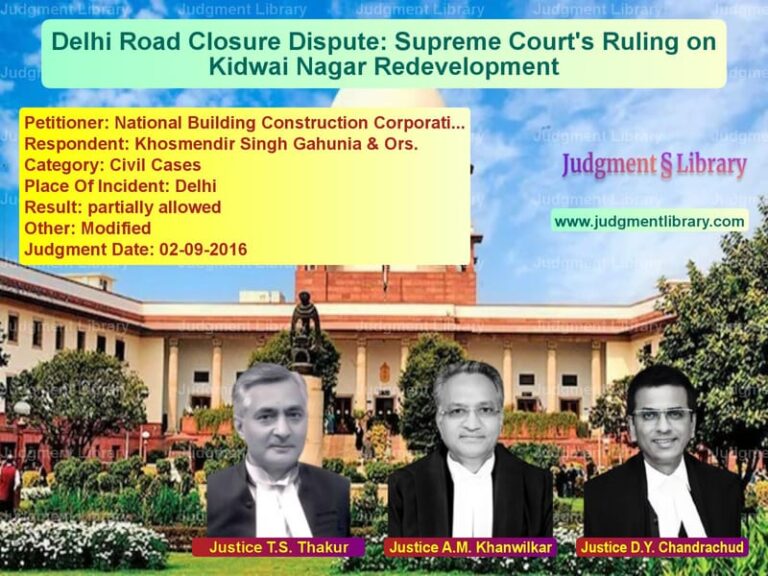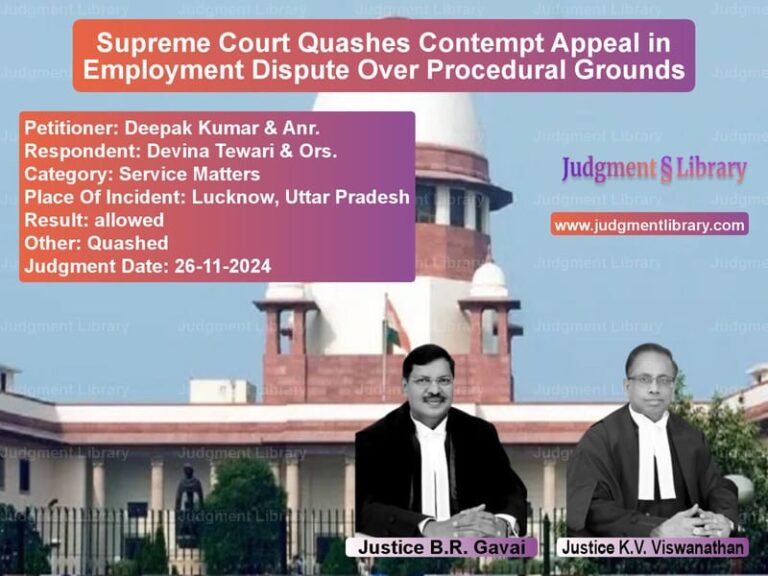Illegal Coastal Constructions: Supreme Court Orders Demolition in Maradu Municipality Case
The Supreme Court of India, in the case of The Kerala State Coastal Zone Management Authority vs. The State of Kerala Maradu Municipality & Others, delivered a landmark ruling on illegal constructions in ecologically sensitive coastal areas. The Court directed the immediate demolition of unauthorized buildings constructed in violation of the Coastal Regulation Zone (CRZ) norms. This decision highlights the significance of environmental regulations and the necessity for strict compliance with CRZ notifications to prevent ecological damage.
Background of the Case
The dispute originated when the Kerala State Coastal Zone Management Authority (KSCZMA) challenged the construction of high-rise buildings in Maradu Municipality, Ernakulam, alleging that they were built within CRZ-III zones, where construction is prohibited. The constructions had been approved by local panchayats and municipal authorities without obtaining the necessary clearance from the KSCZMA.
The High Court of Kerala had previously ruled in favor of the builders, reasoning that the builders could not be held accountable for the failure of local authorities to comply with CRZ rules. The KSCZMA appealed this decision before the Supreme Court.
Legal Issues Considered
- Whether the construction approvals granted by local panchayats and municipalities violated CRZ notifications.
- Whether the builders could be held responsible for these violations.
- The extent of judicial intervention required to prevent further environmental damage.
Arguments by the Appellant (KSCZMA)
The KSCZMA argued:
- The constructions were raised in prohibited zones under CRZ-III regulations, which allow only minor repair work and prohibit new large-scale developments.
- The local bodies violated statutory provisions by issuing building permits without obtaining necessary environmental clearance.
- The constructions posed serious environmental risks, disrupting natural water flow and leading to the degradation of wetlands.
- The state must strictly enforce CRZ norms to prevent natural calamities exacerbated by unchecked coastal development.
Arguments by the Respondents (Builders and Local Authorities)
The respondents countered:
- The buildings were constructed based on legally obtained permits from local municipal authorities.
- The builders could not be held accountable for lapses committed by local bodies in verifying CRZ restrictions.
- The demolition of already completed buildings would lead to severe financial losses and displace residents.
Supreme Court’s Key Observations
After reviewing the legal provisions and expert reports, the Supreme Court made the following observations:
1. Violations of CRZ Norms
- The Court held that the constructions were unauthorized as they fell within CRZ-III zones, where large-scale developments are prohibited.
- The relevant CRZ notifications explicitly restrict construction activities in such ecologically sensitive areas.
2. Local Authorities’ Failure to Enforce Environmental Laws
- The Court criticized the role of local panchayats and municipalities in granting permissions without verifying CRZ restrictions.
- “Authorities must act as guardians of the environment, ensuring that development does not come at the cost of ecological balance.”
3. Strict Enforcement of Environmental Laws
- The Court emphasized that adherence to environmental laws is non-negotiable and violators cannot be excused, even if they obtained approvals from local authorities.
- “Environmental protection is paramount, and no amount of economic justification can override legal prohibitions.”
Final Judgment
The Supreme Court ruled:
- The constructions were illegal and must be demolished within one month.
- Local authorities were directed to ensure strict compliance with CRZ regulations in future approvals.
- The Kerala State Coastal Zone Management Authority was authorized to oversee the demolition process.
Implications of the Judgment
The ruling has significant implications for urban planning and environmental law enforcement:
1. Strengthening CRZ Norms
- The ruling reinforces the importance of CRZ notifications in protecting coastal ecology.
- Authorities must exercise greater caution before approving coastal developments.
2. Accountability of Local Authorities
- Local bodies must strictly adhere to environmental laws when granting construction permits.
- Failure to comply with CRZ norms will result in legal consequences.
3. Precedent for Future Cases
- The decision serves as a strong precedent for future cases involving illegal coastal constructions.
- Developers and local authorities must ensure full compliance with environmental laws before approving projects.
Conclusion
The Supreme Court’s decision in The Kerala State Coastal Zone Management Authority vs. The State of Kerala Maradu Municipality & Others underscores the necessity of environmental conservation. By ordering the demolition of unauthorized constructions, the Court reaffirmed its commitment to upholding CRZ regulations and preventing further ecological degradation. This landmark ruling will serve as a guiding principle for future disputes involving illegal coastal developments.
Petitioner Name: The Kerala State Coastal Zone Management Authority.Respondent Name: The State of Kerala Maradu Municipality & Others.Judgment By: Justice Arun Mishra, Justice Navin Sinha.Place Of Incident: Maradu Municipality, Kerala.Judgment Date: 08-05-2019.
Don’t miss out on the full details! Download the complete judgment in PDF format below and gain valuable insights instantly!
Download Judgment: The Kerala State Coa vs The State of Kerala Supreme Court of India Judgment Dated 08-05-2019.pdf
Direct Downlaod Judgment: Direct downlaod this Judgment
See all petitions in Environmental Cases
See all petitions in Landlord-Tenant Disputes
See all petitions in Property Disputes
See all petitions in Judgment by Arun Mishra
See all petitions in Judgment by Navin Sinha
See all petitions in allowed
See all petitions in Quashed
See all petitions in supreme court of India judgments May 2019
See all petitions in 2019 judgments
See all posts in Environmental Cases Category
See all allowed petitions in Environmental Cases Category
See all Dismissed petitions in Environmental Cases Category
See all partially allowed petitions in Environmental Cases Category







